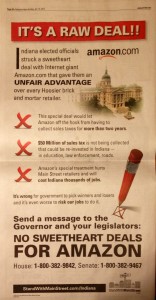You might open a newspaper soon to see an ad like the one at right which appeared in my local paper a few days ago. It encourages you to "Stand With Main Street" to protest "special treatment" of Amazon.com that allows them to forgo the collection of sales tax on online purchases, resulting in an unfair advantage over "every Hoosier brick and mortar retailer." I don't usually see full-page ads related to Internet commerce in a market this size, so I thought I'd investigate the issues at stake.
The question of taxing e-commerce transactions is a bit complicated to be sure. If you have a strong and concisely-worded position on it, you're probably running for national political office, or a Libertarian, or both.
On one hand we can see the clear financial and psychological advantage that an online retailer has with customers who are weighing a purchase from a local store that charges tax against an online store that doesn't, and maybe offers the item at a slightly lower price too. At the same time, that online retailer may be benefitting from the infrastructure that sales taxes others are collecting help pay for (setting up warehouses, trucking goods around state roads, etc.).
On the other hand, we know that laws around state sales taxation were created prior to the age of the Internet and that the models of online business and affiliate sales have completely changed the way the world does business, and current attempts to rewrite them in order to create short-term bandaids on ailing state economies are probably not in the best interest of business innovation, especially when they favor large retailers (online and off) and send small businesses and people who make a living as Amazon.com or eBay affiliates into a quagmire of tax collection bureaucracy.
(In my company's work building online stores for our clients, we've experienced this firsthand; helping a small business calculate the city, county and state tax rates that affect what they're selling customers and then keeping that information current can take up a lot of their time. Services like taxcloud.net are helping make it easier.)
Some states are moving toward "origin-based sourcing" for taxation, where the tax rate is based on the county/state where the vendor selling the goods is located. This keeps the taxation process simple (the retailer has to know their local rate and doesn't have to worry about where the buyer lives or what the rates are there) and encourages governments to keep their tax rates competitive for businesses that might locate there.
Indiana is still a "destination" state, where the tax rate is based on where the goods are being sent. Indiana Congressman Mike Pence, not generally known for advocating taxation, is supporting the move to make Amazon.com and others pay sales tax so that the government isn't "picking winners and losers." But as others point out, the playing field of retail taxation is already off-kilter in favor of big businesses, which get tax credits, exclusions and special pricing that make it very hard for mom-and-pop shops to compete with them.
Back and forth, back and forth.
I don't have a strong feeling about what direction we should go (hence disqualifying me from running for office), other than that all of this highlights how complex and outdated the modern system of taxation is, for online commerce and pretty much everything else. When small businesses or people selling used exercise equipment from their basements have to hire tax law professionals just to sell online and be fully compliant, we're doing something wrong. I'm not sure the "Stand With Main Street" ad advances the conversation any, but it hopefully encourages more awareness about what's at stake.
 I’m a journalist, publisher, software developer and entrepreneur with experience as a founder and organizational leader. Work with me or learn more about me.
I’m a journalist, publisher, software developer and entrepreneur with experience as a founder and organizational leader. Work with me or learn more about me.

We really need the feds to step up and make every online retailer pay a uniform sales tax. Yes it would be a nightmare collecting different amounts per State and local laws. My thought would be a five percent tax on every transaction. It wouldn't be perfect but it would level the playing field.
Oh please... It is no more confusing than any other law. Once enacted, Quickbooks will have a program for it in no time.
If you are selling a product, you should be collecting the appopriate tax. It is amazing this has gone on unchecked as long as it has. Please quit trying to make it complicated~!